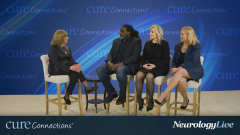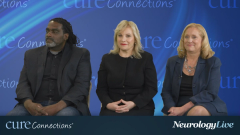
Treatment Adherence and Comprehensive Care in Multiple Sclerosis
Craig Mainor and Dr Mary Ann Picone highlight the role of comprehensive care and importance of treatment adherence for people living with multiple sclerosis.
Episodes in this series

June Halper, MSN, APN-C, MSCN, FAAN: Do you have a treatment team or just Dr Picone? She’s enough.
Craig Mainor: She is. Definitely. Dr Picone is the quarterback, but there’s a whole team behind her. I’m very happy and satisfied with the services I’ve been getting.
June Halper, MSN, APN-C, MSCN, FAAN: Terrific. Dr Picone, how do you manage? Has your workload changed since all the disease-modifying therapies have come along?
Mary Ann Picone, MD: First, thanks for saying I’m the quarterback. I’m going to call Tom Brady and see what he thinks.
Craig Mainor: You’re better than Tom.
Mary Ann Picone, MD: My workload has changed a lot. As Craig was saying, when individuals look at him, they may not think there’s anything wrong. In a way, that’s a good thing. Sometimes it can be frustrating for patients, because they may be fatigued or have numbness and other symptoms that are invisible but can be quite disabling at times. That can be frustrating. When patients first get diagnosed, they have an image of being in a wheelchair. Fortunately, that has changed a lot. That’s something that I’ve seen improve over the years with the different disease-modifying therapies that we have. It can be a little challenging because we have more choices, but that’s great for patients because we have options—injectable medications, oral therapies, intravenous therapies, which have continually improved in efficacy. The goal is for patients to be able to live as normal a life as possible—to live their lives, work, have families. The best thing I hear from patients is when I ask, “Is there anything that reminds you that you have MS [multiple sclerosis]?” I want them to say, “There isn’t.”
June Halper, MSN, APN-C, MSCN, FAAN: Is that true, Craig?
Craig Mainor: That’s absolutely true. When I was having exacerbations, that was the only time I was reminded of my MS situation. I’m feeling good now, and I’m glad to have this conversation. But it’s important for someone going through MS as a patient to understand that there will be ups and downs. There will be times between exacerbations when you may want to forget, but it’s important to stay consistent with the treatment and communicate with your team. It’s important. I’ve been through that. There were times when I just thought, “I’m done. I’m cured. I’m going to go on with my life.” But then there are small, sometimes large, reminders that it’s not over and that you need to stay consistent with your treatment.
June Halper, MSN, APN-C, MSCN, FAAN: Individuals tend to forget about the relapses. I’m a nurse practitioner. Some of the newer nurse practitioners have never seen a relapse. When we go to a nurses meeting, they’ll say to me, “What does a relapse look like?” I say, “You’ll recognize it when it comes.”
We were talking before the show about how MS comprehensive care has changed. We founded the [Consortium of] MS Centers in 1985, before the drugs came along—no DMTs [disease-modifying therapies]. At that time, we were able to do things like symptomatic management and counseling but not disease modification. Things have changed. Many more individuals are gravitating toward MS centers. Do you see that remaining as a model, Craig, now that we have all these drugs to stabilize? Or do you think patients are going to go to MS centers?
Craig Mainor: I don’t know if I have enough information to answer that. There was value for me to go to a center. It was all new to me—very scary, very dark. We talked about the wheelchair. I thought I was going to be in a wheelchair 20 years ago. If you had said to me, where do you see yourself with your diagnosis? I probably would have said a wheelchair or a walking instrument. Luckily, I haven’t needed that, so it’s hard for me to imagine not going to a center of resources I’ve found in MS.
June Halper, MSN, APN-C, MSCN, FAAN: Have you ever worked with any of the support staff besides Dr Picone?
Craig Mainor: Yeah. As I said, there was a period in my diagnosis where I needed to talk to someone, and I found the resource to be able to talk and listen to someone about my psychology with this disease. I found real value in that.
June Halper, MSN, APN-C, MSCN, FAAN: That’s great. Do you recommend that to others? The other guys you get to meet?
Craig Mainor: Absolutely. One other thing, which I didn’t take advantage of early on: when I first got diagnosed, the doctor and her team suggested I go to small- or large-group discussions with other individuals who were experiencing MS. I didn’t because I was fighting the diagnosis myself. There’s a value in sitting with someone who’s going through what you’re going through. An open, honest dialogue could be the difference between wallowing in your own sorrow and finding the hope and the promise of what’s options are out there. Medication, sitting down with a professional and a mental health professional. I open my door to anyone. I give my phone number to anyone who wants to talk about it.
Transcripts edited for clarity
Newsletter
Keep your finger on the pulse of neurology—subscribe to NeurologyLive for expert interviews, new data, and breakthrough treatment updates.













